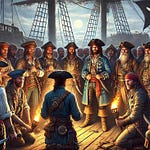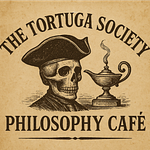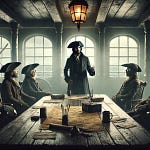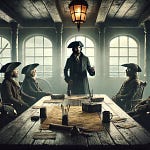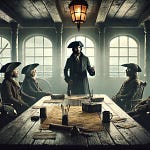The Tortuga Society was proud to host it’s inaugural Book Club Session on the beginning of Ken Follett’s novel: The Pillars of the Earth.
Join the Tortuga Society to participate in future sessions!
We discuss —
Introduction & Format
Inaugural Tortuga Book Club meeting on The Pillars of the Earth
Housekeeping: shared Notion page, rotating member‐led presentations encouraged
Goal: tie medieval context back to modern “anarchy” in society and Tortuga themes
Historical Context
Setting: 12th-century Kingsbridge, just after the Norman Conquest during “The Anarchy”
Comparison to today’s post-WWII/Bretton Woods order unraveling (financial & institutional collapse)
Generational-cycle parallel (Strauss & Howe’s Fourth Turning) between medieval crisis and modern era
Language & Culture
Multicultural England: Norman French aristocracy, Anglo-Saxon remnants, Latin liturgy
Lack of standardized language/grammar; role of Church in preserving texts
Vocabulary confusion: prior vs. archbishop vs. earl, etc.—suggestion for a future mini-presentation
Craftsmanship & Sensory Detail
Tom Builder’s vivid mental imagery of cathedral architecture (“a tunnel with refinements”)
Contrast between tangible, skill-based work vs. modern knowledge-worker ennui
Pleasure and “map of attention” embedded in handmade artifacts
Character Archetypes & Masculinity
Tom’s higher calling, impulse control struggles, and fleeting desires
Ellen’s resourcefulness vs. lack of formal identity or legal standing
Agnes’s practical grounding and comic relief
Alfred as lovable “floater” and Prior Philip as thoughtful spiritual leader
Discussion of Jack Donovan’s four masculine virtues (strength, courage, honor, mastery)
Law, Reputation & Punishment
Importance of reputation in a non-literate society (e.g., brawl justification, outlaw marking)
Scarcity’s role in harsh penalties (stealing a pig ≈ life-upending loss)
Medieval justice vs. today’s more forgiving, debt-enabled replacement economy
Writing Style & Prologue Impact
Simple, accessible prose conveying deep truths (Tom’s perfectionism for God)
Prologue’s execution scene: three distinct followers, sense of injustice, “curse” tension
Follett’s unflinching inclusion of earthy, sexual, and violent details
Broader Themes for Future Discussion







